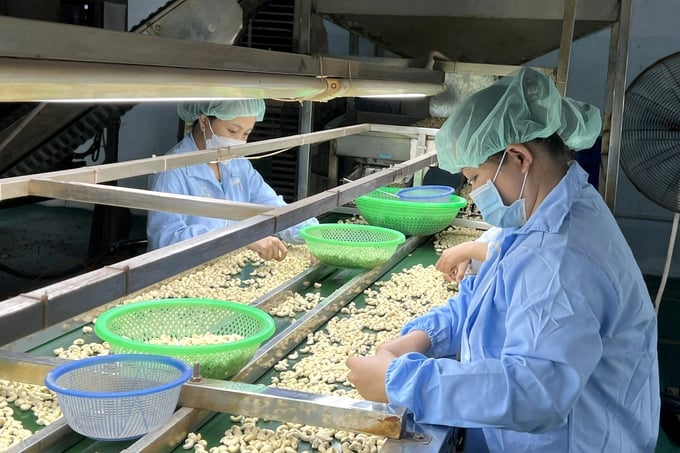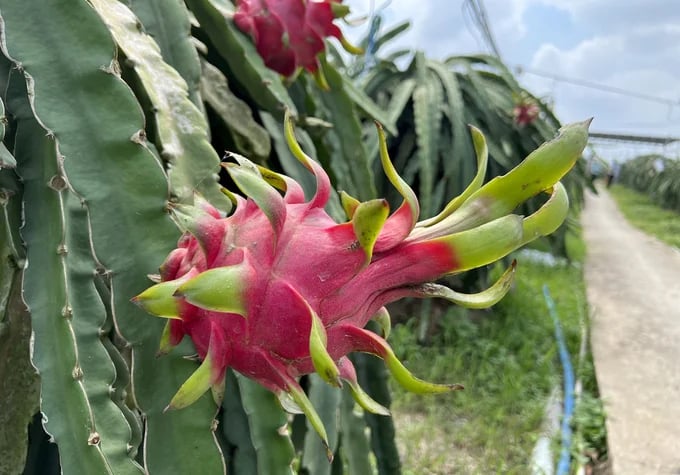November 20, 2025 | 00:31 GMT +7
November 20, 2025 | 00:31 GMT +7
Hotline: 0913.378.918
November 20, 2025 | 00:31 GMT +7
Hotline: 0913.378.918

China is a large market for Vietnamese cashew nuts. Photo: Son Trang.
On December 6, in Ho Chi Minh City, SPS Office Vietnam coordinated with Ho Chi Minh City Food Safety Management Authority and Vietnam Agriculture News to organise the Conference "Guiding businesses to meet requirements on Sanitary and Phytosanitary Safety (SPS) when exporting agricultural and food products to China". The conference attracted hundreds of businesses currently exporting agricultural products, seafood and food to China.
According to Mr. To Ngoc Son, Deputy Director of the Asia-Africa Market Department, China has continuously been Vietnam's largest trading partner over the past 20 years. China is also the leading market for many key agricultural products of Vietnam. Specifically, China is the largest market for vegetables, cassava and rubber. Regarding seafood, China is the third largest market after the US and Japan.
In particular, there are goods imported into China in which Vietnam was nearly the sole supplying market. For example, 100% of frozen pangasius fillets and dragon fruit imported into China in 2021 are from Vietnam.
Mr. Pham Trung Nghia, Deputy Chief of Office of the Interdisciplinary Steering Committee for International Economic Integration, said that China has been and will be an important market for Vietnam for both exports and imports. China will also be important for both official and border trade, for both standard and non-standard goods... Therefore, in addition to developing other markets, especially those that have FTAs with Vietnam, businesses need to focus on exploiting the Chinese market.
To promote the export of agricultural products and food to China, meeting food safety and sanitary and phytosanitary safety (SPS) requirements when exporting agricultural and food products to China is a major factor. At the Conference, Mr. Hoang Ly, Center for Quality of Agricultural, Forestry and Fisheries Region 5 (National Agro-Forestry-Fisheries Quality Assurance Department), guided businesses to understand market regulations on meeting quarantine and food safety requirements in seafood exports to China.
Accordingly, in addition to general requirements, seafood export enterprises also need to understand specific requirements. For example, facilities that specialise in packing black tiger shrimp, whiteleg shrimp, crabs, and live lobsters must be on a separate list recognized by China.
Facilities farming black tiger shrimp and white leg shrimp must also be on the list recognized by China. These farming facilities must be inspected and certified by the local aquaculture management agency to ensure safety, hygiene and veterinary conditions for code acquisition, inspected by the local veterinary agency to monitor TSV, MBV, WSSV, and IHHNV diseases over 3 stages of farming...
Mr. Hoang Ly also noted that manufacturing enterprises should register to export seafood products on the Single Window Trading System (CIFER) of the General Administration of Customs of China (GACC). It is necessary to be proactive in registering for renewal on CIFER because the processing and approval of registration documents on CIFER is often slow. The Chinese side is also slow to respond to the Vietnamese side's application for registration of information changes (product additions).

100% of dragon fruits imported into China are from Vietnam. Photo: Son Trang.
Ms Tran Thi Phuong Hoa, a specialist in the Department of Food Safety and Environment (Department of Plant Protection), shares about the regulations in China's Order 248 related to the management and registration of enterprises exporting agricultural products and food to this market.
Accordingly, the Plant Protection Department is the competent agency in registering businesses exporting foods of plant origin to China, with 7 groups of agricultural products/foods of plant origin, including: cereals (rice, cassava); fresh vegetables, dehydrated vegetables and dried beans; spices of natural origin (cinnamon, anise, pepper, dried chilli...); nuts and seeds (cashews, lotus seeds...); dried fruits (longan, dried lychee, dried longan...); unroasted coffee and cocoa beans; frozen fruit.
Regarding bird's nest products, Mr Nguyen Quang Anh, a specialist at the Department of International Cooperation and Communications (Department of Animal Health), said that bird's nests exported to China are regulated as products that have had dirt and feathers removed and are safe for consumers. The bird's nest must be heat treated to ensure the product's core temperature reaches 70oC for at least 3.5 seconds.
The bird's nest must originate from a bird's nest that is registered with a competent authority and supervised by a veterinary agency that monitors disease and food safety. The bird's nest must not be located in areas with avian influenza within the 12 months prior to the time of export. Products must originate from registered and GACC-approved processing enterprises…
Translated by Hoang Duy

(VAN) On November 18, Deputy Prime Minister Tran Hong Ha chaired the 22nd session of the National Steering Committee on Anti-IUU Fishing.

(VAN) Prime Minister Pham Minh Chinh has issued an official dispatch directing focused response efforts and the swift remediation of damage caused by recent floods in the Central region.

(VAN) Deputy Minister Nguyen Thi Phuong Hoa calls for prioritizing the livelihoods of coastal residents, particularly those impacted by marine economic development projects.

(VAN) People can now submit their land-use right certificates ('red books') via the VNeID application. This marks an essential step toward fully paperless public services in land administration in the near future.

(VAN) Fishermen and authorities in Khanh Hoa province are demonstrating strong resolve in the fight against IUU fishing, aiming to develop a sustainable fisheries sector and remove the European Commission's (EC) ‘yellow card.’

(VAN) Viet Nam has declared that it will develop and implement strong greenhouse gas reduction measures to achieve Net Zero emissions by 2050 and it is following through on that commitment.

(VAN) A comprehensive legal framework, tailored to domestic conditions, serves as the foundation guiding economic sectors toward low-emission development.